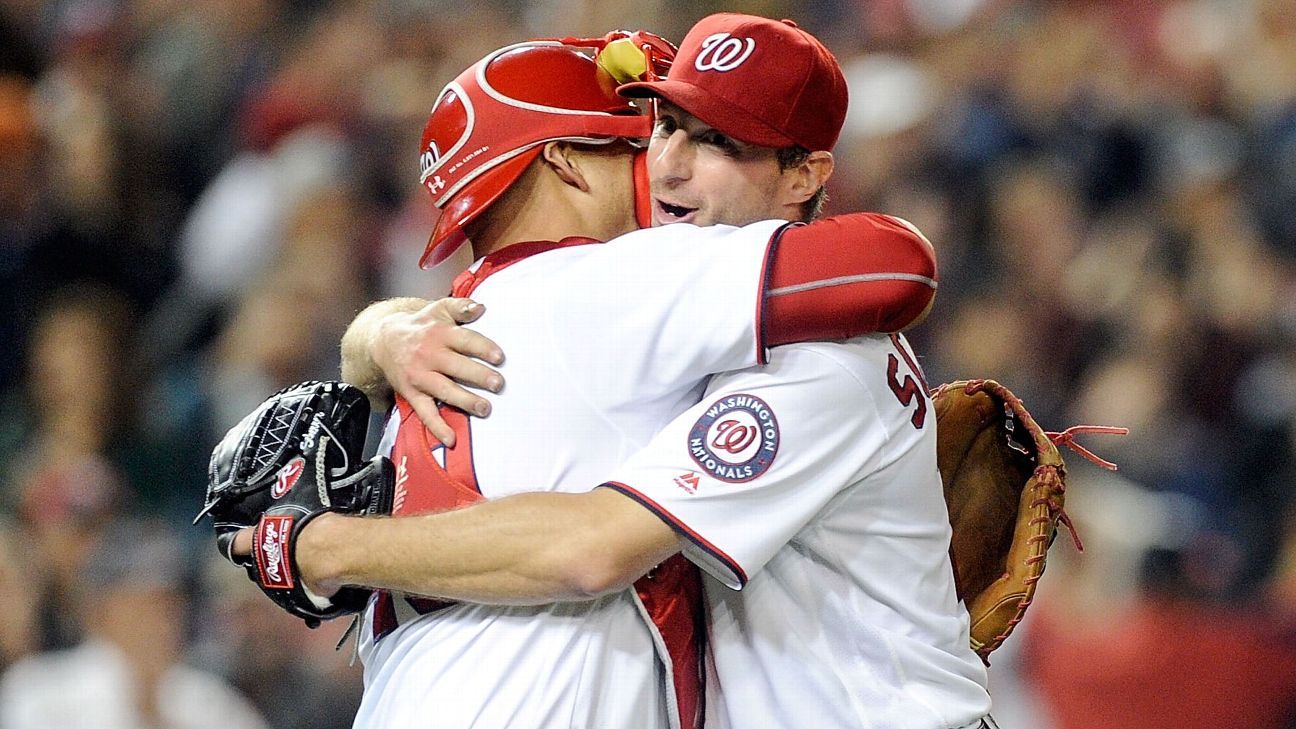Editor’s note: This original version of this story ran on June 27, 2018. As part of ESPN’s Strikeout Saturday on March 28, 2020, David Schoenfield updated his evaluations, particularly of who’s most likely to beat each team’s best-ever pitching performance.
On May 4, 2018 Gerrit Cole pitched one of the best games you will ever see. He fired a 16-strikeout shutout against the Diamondbacks, allowing just one hit and one walk. As a remarkable side note, Cole didn’t strike out any batters in the first or ninth innings, so 16 of the 21 outs from the second through the eighth were strikeouts. His final two pitches were 99 mph. Cole called it “probably my best” start of his career. Umm, no “probably” needed there.
I wondered: Was this the best start in Astros history? Cole’s Game Score was 100, a rare achievement. There have been just 15 such games in outings of nine innings or fewer since 1908, so while Cole’s game didn’t receive the notoriety of a no-hitter or perfect game, it was more impressive in many ways, less reliant on the fortune of where a ball was hit and more dependent on his pure dominance.
With Cole’s game in mind, I thought it would be fun to research the best starts for every franchise. This wasn’t as simple as just finding the best Game Score for every team. With the way Game Score is calculated, the more innings you pitch, the higher your Game Score can go, so most franchise records are from games from decades ago, when pitchers would pitch deep into extra innings. You also have to consider the opponent and the era — strikeouts are more plentiful now, although complete games are scarce.
Two final notes before I reveal my selections:
• I considered only regular-season starts. Postseason is another beast altogether given the importance of every game (though my editor says to be prepared to go there come October). There is one franchise, however, for which the highest nine-inning Game Score in a postseason game matches the best in the regular season.
• This list goes back to only 1908, which is as far back as the invaluable Baseball-Reference Play Index goes. So whenever I might say “history,” I really mean since 1908.
Strikeout Saturday schedule on ESPN
• 12 p.m. ET: Roger Clemens becomes the first MLB pitcher to fan 20 in a nine-inning game — vs. Seattle Mariners on April 29, 1986
• 2 p.m. ET: Kerry Wood Ks 20 in a one-hit shutout at Wrigley Field vs. the Houston Astros — May 6, 1998
• 4 p.m. ET: Randy Johnson dominates the Cincinnati Reds with a 20-strikeout performance — May 8, 2001
• 6 p.m. ET: Max Scherzer notches 20 strikeouts vs. his old team, the Detroit Tigers — May 11, 2016
 Los Angeles Angels: Nolan Ryan (July 15, 1973, versus Tigers)
Los Angeles Angels: Nolan Ryan (July 15, 1973, versus Tigers)
Pitching line: 9 IP, 0 H, 0 R, 4 BB, 17 SO (Game Score: 100)
There’s no better pitcher to start this list with than Ryan, the king of the no-hitter. He was so dominating in the second of his seven career no-hitters that Tigers slugger Norm Cash walked up to the plate in the ninth inning with a table leg instead of a bat — admitting that no matter his weapon of choice, he had no chance. That sounds like a tall tale from 1922 or something, except we have video evidence:
For argument’s sake: Dean Chance won the Cy Young Award in 1964 when he went 20-9 with a 1.65 ERA, throwing 15 complete games and 11 shutouts — even though he didn’t join the rotation for good until the end of May. On June 6, he threw 14 scoreless innings against the Yankees, striking out 12 and allowing just three hits, good for a Game Score of 116 (although he ended up with a no-decision).
Most likely to beat it: Now that Shohei Ohtani is healthy again, we can dream of that game in which everything comes together and he pitches a 16-strikeout no-hitter.
Noteworthy: Not surprisingly, Ryan is also the king of the Game Score. He has four games of 100-plus. The only pitcher with more (since 1908) is Walter Johnson, who had seven, but all of his were in outings of 12 innings or more. Three of Ryan’s four 100s were nine-inning outings and the fourth was 10 innings. Put it this way: There have been just 15 nine-inning Game Scores of 100 or more, and Ryan has three of them.
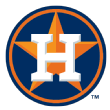 Houston Astros: Mike Scott (Sept. 25, 1986, versus Giants)
Houston Astros: Mike Scott (Sept. 25, 1986, versus Giants)
Pitching line: 9 IP, 0 H, 0 R, 2 BB, 13 SO (Game Score: 98)
This was the season Scott could have been arrested for doing unnatural things to a baseball. He won the Cy Young Award with a 2.22 ERA and 306 strikeouts in 275 1/3 innings, the most strikeouts in a season in the 1980s. This no-hitter was especially memorable because it also clinched the division title, pushing it to the top among the best performances in Astros history.
For argument’s sake: Gerrit Cole (with his one-hitter with 16 strikeouts in 2018) and Justin Verlander (his 14-strikeout no-hitter last September) have both topped Scott with a Game Score of 100, but I’m sticking with Scott’s no-hitter to clinch the division. Verlander’s 100 beat his previous high of 95, done twice with the Tigers, but it came against a bad, strikeout-prone Toronto lineup.
Most likely to beat it: With Cole now in pinstripes, Verlander is the guy, but if 100 isn’t good enough to beat Scott, it may take a perfect game with double-digit strikeouts to surpass him.
Noteworthy: In reviewing these performances, it’s important to remember the context of the era. Scott averaged 10.0 K’s per nine innings in a league where the average was 6.0. Cole has averaged 13.1 in a league over the last two years where the average is 8.7. Scott was 67 percent better than the league average; Cole has been 51 percent better.
 Oakland Athletics: Bobby Witt (June 23, 1994, versus Royals)
Oakland Athletics: Bobby Witt (June 23, 1994, versus Royals)
Pitching line: 9 IP, 1 H, 0 R, 0 BB, 14 SO (Game Score: 99)
Witt was one of the most prized draft prospects of the 1980s when the Rangers selected him third overall in 1985 out of Oklahoma. He had a 16-year career, but never completely harnessed his blazing fastball and walked 100-plus batters in a season six times. For one glorious day, however, everything came together. The only baserunner came on Greg Gagne’s bunt single in the sixth inning — on an apparent blown call by umpire Gary Cederstrom with Witt covering first base.
“Obviously, by replays, the man is out at first,” Witt said after the game. “I think he missed the call. But there’s nothing I can do about it now.”
For argument’s sake: Witt’s game is the best nine-inning Game Score in A’s history (one point better than Catfish Hunter’s perfect game in 1968), but how about Jack Coombs in 1910: 16 IP, 3 H, 0 R, 6 BB, 18 SO, Game Score of 128.
Most likely to beat it: Sean Manaea‘s no-hitter in 2018 against the eventual World Series champs registered a 95, but Jesus Luzardo has the stuff to register some dominant performances.
Noteworthy: In the divisional era since 1969, two pitchers recorded 13 games in one season with a Game Score of 80 or higher: Vida Blue in 1971 and Nolan Ryan in 1972. Blue’s best game that magical MVP/Cy Young season was an 11-inning scoreless effort in which he struck out 17 batters with no walks. From April 13 through July 21, Blue made 22 starts and pitched 196 2/3 innings. He was 21 years old.
 Toronto Blue Jays: Brandon Morrow (Aug. 8, 2010, versus Rays)
Toronto Blue Jays: Brandon Morrow (Aug. 8, 2010, versus Rays)
Pitching line: 9 IP, 1 H, 0 R, 2 BB, 17 SO (Game Score: 100)
Morrow’s 17-strikeout masterpiece was almost a no-hitter as well. The only hit was Evan Longoria‘s two-out infield single in the ninth off the glove of a diving Aaron Hill.
For argument’s sake: Blue Jays fans are no doubt sentimental about Dave Stieb’s no-hitter in 1990 after he had come close to one several times earlier in his career.
Most likely to beat it: Nate Pearson hasn’t yet reached the majors, but he may be the best pitching prospect in the minors. With his blazing fastball, wipeout slider, plus changeup and control, he’s the one minor leaguer I’d be willing to put “100” potential on.
Noteworthy: Morrow’s 100 is the best Game Score in Blue Jays history, including extra-inning games. He doesn’t hold the club strikeout record, however, as Roger Clemens fanned 18 in a 1998 shutout (with a Game Score of 99).
 Atlanta Braves: Joe Oeschger (May 1, 1920, versus Robins)
Atlanta Braves: Joe Oeschger (May 1, 1920, versus Robins)
Pitching line: 26 IP, 9 H, 1 R, 4 BB, 7 SO (Game Score: 153)
OK, baseball was a much different game in 1920, when it was still routine for starting pitchers to remain in the game regardless of inning. Still, this game was beyond extreme, even for 1920: Oeschger and Leon Cadore both went the distance in a 1-1 tie, with Oeschger recording the highest Game Score in history (Cadore’s 140 is second-highest). With a conservative estimate of three pitches per batter, we’re talking nearly 300 pitches for each guy, and probably more. Oeschger (pronounced “Eshker”) himself estimated he threw 250 fastballs that day and Cadore “at least 300 curves.” The New York Times report didn’t mention the two hurlers until the ninth paragraph, more impressed that the game simply went a record 26 innings.
For argument’s sake: If you prefer a nine-inning effort, Warren Spahn’s 15-strikeout, two-walk no-hitter in 1960 registers as one of those rare 100 games. Spahn had just 18 double-digit strikeout games in his career, and this one did come against a bad Phillies team in September.
Most likely to beat it: Mike Soroka doesn’t have the high-octane fastball that usually goes with the highest Game Scores, but if he can improve his strikeout rate to go with his ability to induce soft contact, he could put up some big efforts.
Noteworthy: We’ve mentioned the Boston Braves and Milwaukee Braves, but the top game in Atlanta Braves history actually belongs to Kevin Millwood, with a 98 when he spun a one-hitter with 13 strikeouts in 1998. Greg Maddux’s best Game Score was 96, John Smoltz’s was 93 and Tom Glavine’s a mere 90. Phil Niekro’s best was 91, which he did three times.
 Milwaukee Brewers: Teddy Higuera (Aug. 26, 1987, versus Indians)
Milwaukee Brewers: Teddy Higuera (Aug. 26, 1987, versus Indians)
Pitching line: 10 IP, 3 H, 0 R, 2 BB, 10 SO (Game Score: 94)
For a few years there, the little lefty from Mexico was one of the best in the game. He followed this game up with a one-hit shutout, Game Score of 92, for the rare back-to-back 90s.
For argument’s sake: Ben Sheets fanned 18 in 2004 while matching Higuera’s 94 in nine innings, but did allow a run in that game.
Most likely to beat it: Brandon Woodruff averaged 10.6 K’s per nine last season and had an 86 against the Phillies in an eight-inning effort in which he allowed one hit and one run with 10 K’s.
Noteworthy: The Brewers have the weakest slate of “great” games of any franchise other than possibly the Rockies, with just 11 games of 90 or better since they were born as the Seattle Pilots in 1969. Even the two 1998 expansion teams have more. Maybe this isn’t surprising. Really, Higuera is the only great starter in Brewers history and he got injured. Sheets was a four-time All-Star, but only had one monster season. Mike Caldwell had a big 1978. Mostly, though, it’s been a bunch of blah.
 St. Louis Cardinals: Jose DeLeon (Aug. 30, 1989, versus Reds)
St. Louis Cardinals: Jose DeLeon (Aug. 30, 1989, versus Reds)
Pitching line: 11 IP, 1 H, 0 R, 0 BB, 8 SO (Game Score: 103)
This is one of my favorite games on the list, in part because DeLeon didn’t dominate in the strikeout column. Still, he threw a mere 109 pitches, and here’s the thing: He got a double play, so he actually faced the minimum 33 batters. He’s the only pitcher to go exactly 11 innings and face the minimum number of batters.
For argument’s sake: In the eighth start of his career, Shelby Miller allowed a leadoff single to Eric Young of the Rockies and then retired the next 27 in a row, finishing with 13 strikeouts and the highest nine-inning Game Score in Cardinals history at 98.
Most likely to beat it: Jack Flaherty had four games with an 80-plus Game Score in 2019 — only Verlander and Cole, with five apiece, had more.
Noteworthy: What about Bob Gibson, you ask? Gibson’s best Game Score was 100, although it took him 13 innings to get there. His best for nine innings was 96. His 17-strikeout game in the World Series was a 93. Of course, I’d love to see what he could do in today’s high-strikeout era. He might strike out 17 every start.
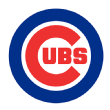 Chicago Cubs: Kerry Wood (May 6, 1998, versus Astros)
Chicago Cubs: Kerry Wood (May 6, 1998, versus Astros)
Pitching line: 9 IP, 1 H, 0 R, 0 BB, 20 SO (Game Score: 105)
On a gray afternoon at Wrigley Field, a baby-faced 20-year-old Texan took the mound for his fifth career start and threw what many regard as the greatest game ever pitched. It wasn’t a perfect game; it wasn’t even a no-hitter. It was maybe better. Wood tied Clemens’ record with 20 strikeouts in a game and allowed only an infield hit in the third inning on a slow dribbler to third base. He overpowered a strong Houston team that would win 102 games that year with a blazing fastball and curveball that had the Astros flailing like schoolkids at a wiffle ball. It wasn’t fair.
“We had heard the hype,” Astros shortstop Ricky Gutierrez told the Chicago Tribune earlier this year. “We saw him warming up. But then came those first three guys. He mows them down. Biggio. Bell. Bagwell. It was like, ‘Wow!'”
Wood finished with a Game Score of 105, the highest ever for a nine-inning game. Max Scherzer has the second-highest at 104. The highest for a perfect game is 101. Wood threw 122 pitches, 84 for strikes, 24 of those swing-and-misses. Bell swung at the final curveball and missed by a mile. Brad Ausmus played for the Astros that day and for the Tigers when Clemens fanned 20. He was the opposing manager when Scherzer fanned 20. “I’ve never seen a pitcher with that type of stuff for nine innings. Ever,” he said of Wood. “It was the best stuff I’ve ever seen in a game. There’s not a close second.”
For argument’s sake: Most of the longstanding franchises have several extra-inning performances that score in the 100s. The Cubs have only two that top Wood’s 105, but the best one was pretty impressive: Lefty Tyler threw 21 innings in a 2-1 victory in 1918, back when Wrigley Field was still known as Weeghman Park, good for a Game Score of 126.
Most likely to beat it: Yu Darvish doesn’t throw as hard as he once did, but in the second half last season he suddenly turned into a strike-throwing machine and over his final 17 starts had 148 K’s and just 12 walks in 106 ⅓ innings.
Noteworthy: Jake Arrieta had a couple of dominant performances with the Cubs, with a 13-strikeout one-hitter in 2014 and his 12-strikeout no-hitter against the Dodgers in 2015 that registers a 98.
 Arizona Diamondbacks: Randy Johnson (May 18, 2004, versus Braves)
Arizona Diamondbacks: Randy Johnson (May 18, 2004, versus Braves)
Pitching line: 9 IP, 0 H, 0 R, 0 BB, 13 SO (Game Score: 100)
Johnson had a 20-strikeout game for the Diamondbacks against the Reds in 2001, but I’ll give the nod to his perfect game against the Braves since it had the higher Game Score and that Reds lineup featured Donnie Sadler hitting leadoff and Alex Ochoa in the cleanup spot. By the way, here’s how much the game has changed since 2004: The NL averaged 6.7 strikeouts per nine innings that year; in 2018, it’s averaging 8.6. What kind of strikeout numbers would Johnson put up now?
For argument’s sake: Curt Schilling also had a 100, firing a 17-strikeout one-hitter with two walks against the Brewers in April 2002.
Most likely to beat it: Robbie Ray has averaged 12.1 K’s per nine over the past three seasons. Unfortunately, he’s also averaged 4.4 walks per nine, so is rarely efficient enough to pitch deep into games (he has one career complete game). New starter Madison Bumgarner has two 98s in his career with one-hit shutouts, but I’m not sure that Bumgarner still exists.
Noteworthy: The Diamondbacks have 16 90-plus games in franchise history, 12 of them from Johnson and Schilling. The other four: Ian Kennedy (2), Patrick Corbin and Brandon Webb.
 Los Angeles Dodgers: Sandy Koufax (Sept. 9, 1965, versus Cubs)
Los Angeles Dodgers: Sandy Koufax (Sept. 9, 1965, versus Cubs)
Pitching line: 9 IP, 0 H, 0 R, 0 BB, 14 SO (Game Score: 101)
All yours, Vin Scully:
For argument’s sake: This was a tough one because Koufax doesn’t have the highest nine-inning Game Score in Dodgers history. That belongs to Clayton Kershaw, with his 15-strikeout no-hitter against the Rockies in 2014 (that game wasn’t a perfect game because of an error). My reasoning: (1) Strikeouts were easier to come by in 2014 than 1965 (7.8 K’s per game versus 5.9); (2) the Rockies’ lineup against Kershaw was pretty weak with guys like Brandon Barnes, Wilin Rosario, Josh Rutledge and Kyle Parker (plus, the Rockies always struggle to hit on the road).
On the other hand, the Cubs had two players making their major league debut the night of Koufax’s gem. On the third hand, every pitch mattered in that game because it was a 1-0 win as Cubs pitcher Bob Hendley threw a one-hitter. And on the fourth hand, the Dodgers have a third 100 game: Nap Rucker, in 1908, had a 14-strikeout no-hitter to match Koufax at 101 — and that was when strikeouts were really rare (3.4 per game).
Most likely to beat it: Walker Buehler had a 15- and 16-strikeout games last season, although allowed home runs in both efforts. Still, he could join Koufax and Kershaw in the 100 club.
Notable: Given their rich history of power pitchers, the Dodgers lead all teams in total number of 90-plus games as well 90-plus games of nine innings:
Overall
1. Dodgers, 126
2. Giants, 102
3. White Sox, 99
4. Indians, 96
5. Reds, 84
Nine innings (or fewer)
1. Dodgers, 91
2. Giants, 64
3. Red Sox, 55
4. Cardinals, 54
5. Indians, 54
6. White Sox, 54
 San Francisco Giants: Juan Marichal (July 2, 1963, versus Braves)
San Francisco Giants: Juan Marichal (July 2, 1963, versus Braves)
Pitching line: 16 IP, 8 H, 0 R, 4 BB, 10 SO (Game Score: 112)
This was one of the more famous pitching duels of all time, as Marichal, 25 years old and on his way to a 25-win season, and 42-year-old Warren Spahn both went the distance before Willie Mays finally won it with a home run in the bottom of the 16th. Giants manager Alvin Dark was going to hit for Marichal in the 13th, but Marichal barked that he wasn’t coming out if his 42-year-old opponent was still in the game. SABR research indicates Marichal threw 227 pitches in the game. Since Marichal’s 16-inning performance, only one other pitcher has gone that deep: Gaylord Perry, another Giants starter, who did it in throwing a shutout in 1967 (also recording a Game Score of 112).
Oh, Marichal also made his next scheduled start on four days of rest — then made his next two starts after that on three days of rest. He’d pitch 68 innings that month.
For argument’s sake: Matt Cain’s 14-strikeout perfect game in 2012 registers an impressive 101, but it came against a putrid Astros team that would lose 107 games. Another option would be Carl Hubbell’s 18-inning shutout in 1933 with 12 strikeouts — also on July 2 — for a 132.
Most likely to beat it: Nobody in the current rotation, and the top prospects in the system are all position players.
Notable: The Baseball-Reference Play Index goes back to 1908, and it’s not surprising that the two pitchers with the most games of 10-plus innings are two deadball hurlers: Pete Alexander (57) and Walter Johnson (55). Third on the list with 37 such games is Perry. The only other post-World War II starters with at least 20 such games are Spahn (23), Robin Roberts (23) and Jim Palmer (20).
 Cleveland Indians: Luis Tiant (July 3, 1968, versus Twins)
Cleveland Indians: Luis Tiant (July 3, 1968, versus Twins)
Pitching line: 10 IP, 6 H, 0 R, 0 BB, 19 SO (Game Score: 99)
Tiant is most remembered for his days with the Red Sox, when he had the big mustache, the funky windup, and threw a lot of junk. That all came after he’d hurt his arm and recovered after the Twins released him. When he first came up with the Indians in 1964, however, he was one of the hardest throwers in the game. Yes, 1968 was the Year of the Pitcher, when nobody could hit — Tiant’s .167 average allowed that season is the second-lowest ever for a starting pitcher — but this 19-strikeout, no-walk gem is still mighty impressive.
For argument’s sake: Len Barker’s perfect game with 11 strikeouts in 1981 came against a pathetic Blue Jays team that hit just .226 that year. If you want to go way back, Addie Joss threw a perfect game in the final days of the 1908 pennant race.
Most likely to beat it: Shane Bieber had a 94 last year with a one-hit, 10-K shutout against the Blue Jays, and a 92 with a 15-K shutout against the Orioles.
Notable: The Indians have a long history of dominant pitchers, including Allie Reynolds, Herb Score, Sam McDowell, young Dennis Eckersley and Kluber. Hall of Famer Bob Feller tops that list, but his best Game Score was a mere 96, with a 13-strikeout one-hitter. Mostly, he walked too many batters (in two of his no-hitters, he issued five walks, and he had three in his third), but he also played in an era with many fewer strikeouts. In 1946, when he struck out 348 batters in 371 ⅓ innings, he averaged 8.4 K’s per nine innings — nearly double the AL average of 4.3.
 Seattle Mariners: Felix Hernandez (Aug. 15, 2012, versus Rays)
Seattle Mariners: Felix Hernandez (Aug. 15, 2012, versus Rays)
Pitching line: 9 IP, 0 H, 0 R, 0 BB, 12 SO (Game Score: 99)
King Felix’s perfect game was almost over after the first batter, but Eric Thames — yes, that Eric Thames — made a great running catch to rob Sam Fuld of a hit. After that, Hernandez dominated, inducing a career-best 26 swing-and-misses. Rays manager Joe Maddon, unhappy with plate umpire Rob Drake’s strike zone, tried to disrupt Felix’s rhythm during a seventh-inning tirade in which he was ejected and took his time leaving the field. It didn’t work. Hernandez fanned Sean Rodriguez looking with a 2-2 slider to end it and raised both arms to the skies.
For argument’s sake: Erik Hanson was a tall right-hander with a big 12-to-6 curveball and he also had a 99, allowing two hits with 11 strikeouts over 10 innings against the Bash Brother A’s in 1990 … only to get a no-decision when Dave Stewart pitched an 11-inning shutout.
Most likely to beat it: You probably have to go with prospect Logan Gilbert, the team’s first-round pick in 2018 who averaged 11.0 K’s per nine in the minors in reaching Double-A in his first professional season.
Notable: Felix’s perfect game was a 1-0 victory for the Mariners. Get this: He had three 1-0 complete-game shutouts that month. In fact, four of his five shutouts that season were 1-0 wins. The only other pitchers with four 1-0 shutouts in a season since 1969 are Fergie Jenkins in 1974 and Bert Blyleven in 1976. Long live the King.
 Miami Marlins: Kevin Brown (June 10, 1997, versus Giants)
Miami Marlins: Kevin Brown (June 10, 1997, versus Giants)
Pitching line: 9 IP, 0 H, 0 R, 0 BB, 7 SO (Game Score: 94)
Brown doesn’t get enough credit for a great career, including an amazing five-year run from 1996 to 2000 in which he had a 2.51 ERA and averaged 7.3 WAR per season. This performance was nearly a perfect game, ruined when he hit Marvin Benard with a pitch with two outs in the eighth. With his power sinker, he recorded 17 ground-ball outs.
For argument’s sake: Edinson Volquez’s no-hitter last season with 10 strikeouts and two walks is the best Game Score in Marlins history at 95.
Most likely to beat it: Sandy Alcantara has explosive stuff, although he lacks control and it hasn’t translated to big strikeout totals yet. He did, however, toss two shutouts last season, including a two-hitter with eight K’s against the Mets that registered a 90.
Notable: Since the Marlins debuted in 1993, they’ve thrown six no-hitters.
 New York Mets: Rob Gardner (Oct. 2, 1965, versus Phillies)
New York Mets: Rob Gardner (Oct. 2, 1965, versus Phillies)
Pitching line: 15 IP, 5 H, 0 R, 2 BB, 7 SO (Game Score: 112)
Not Seaver, not Gooden, not Cone, not deGrom, but … who? Gardner is the most obscure pitcher on this list. He was a 20-year-old rookie making his fifth career start when he drew the second game of a doubleheader on the next-to-last day of the season. He and Phillies veteran Chris Short locked up in a scoreless duel, both going 15 innings in a game that eventually ended in a 0-0 tie after 18 innings. Gardner went 4-8, 5.12 for the Mets in 1966, was traded to the Cubs in 1967, developed arm problems and won just 14 games in the majors over eight seasons with six clubs.
For argument’s sake: David Cone’s 99 on the final day of the 1991 season, when he fanned 19 Phillies with a three-hit shutout, is the highest nine-inning Game Score in Mets history.
Most likely to beat it: Surprisingly, Jacob deGrom‘s highest career Game Score is just 91, done twice, in 2015 and 2016. He has just one career shutout. Still, you know everything could come together for one magical game.
Notable: The Mets have 50 nine-inning performances with a Game Score of 90 or higher, more than many teams that have been around much longer, in part because Shea Stadium and now Citi Field have been good pitchers’ parks. (Shea Stadium was a great park for strikeout pitchers, probably due to bad lighting.) Nobody electrified crowds like the young Dwight Gooden. He’s the only pitcher in MLB history with at least 16 strikeouts in consecutive games, doing it as a 19-year-old rookie in September 1984. The first of those games was a Game Score of 93, the best of his Mets career.
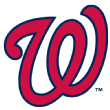 Washington Nationals: Max Scherzer (Oct. 3, 2015, versus Mets)
Washington Nationals: Max Scherzer (Oct. 3, 2015, versus Mets)
Pitching line: 9 IP, 0 H, 0 R, 0 BB, 17 SO (Game Score: 104)
Scherzer joins Nolan Ryan as the only pitchers with at least two nine-inning Game Scores of 100 or more. This one came on the final Saturday of the season against a Mets team that eventually would reach the World Series and is second only to Kerry Wood’s 105 for a nine-inning game. It would have been a perfect game except for Yunel Escobar’s throwing error in the sixth inning. Scherzer’s other 100 came earlier that season with a 16-strikeout one-hitter. His other no-hitter in 2015 comes in at 97, while his 20-strikeout game in 2016 is a mere 87 because he allowed two runs.
For argument’s sake: Scherzer’s 104 is the best game in Expos/Nationals history, regardless of length. Bill Stoneman’s 98 in 1971 is the best in Expos history.
Most likely to beat it: Scherzer is starting to show the little pains and dings that come with age, but he still led the NL in strikeout rate last season.
Notable: Scherzer has just missed two perfect games, losing another one when he hit Jose Tabata of the Pirates with two outs in the ninth. Dennis Martinez did throw a perfect game for the Expos in 1991 and Pedro Martinez was perfect for nine innings against the Padres in 1995, only to give up a hit in the 10th inning.
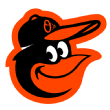 Baltimore Orioles: Erik Bedard (July 7, 2007, versus Rangers)
Baltimore Orioles: Erik Bedard (July 7, 2007, versus Rangers)
Pitching line: 9 IP, 2 H 0 R, 0 BB, 15 SO (Game Score: 98)
Remember that one awesome season for Bedard? He led the AL in fewest hits per nine innings in 2007 and most K’s per nine and had a day to remember in Arlington, a tough park to rack up a big game. The Orioles cashed in and traded him to the Mariners after the season for Adam Jones and Chris Tillman, and Bedard had trouble staying healthy after that.
For argument’s sake: Mike Mussina matched Bedard’s 98 with a one-hit, 15-strikeout game in 2000, walking two batters. The highest extra-inning score belongs to Jerry Walker, who spun a 16-inning shutout in 1959 for a 111. He was only 20 and had started the All-Star Game that year; perhaps not coincidentally he came down with arm problems in 1960. He did have a long career as an executive with the Tigers, Cardinals and Reds.
Most likely to beat it: Grayson Rodriguez is the team’s top pitching prospect. He averaged less than five innings per start in Low-A, so he’s a long ways away, but he is a strikeout machine.
Notable: Here’s an example of how the game has changed. Jim Palmer won three Cy Young Awards, threw 211 complete games and tossed 53 shutouts, but had just 13 double-digit strikeout games in his career — and in just one of those 13 did he allow zero runs. His best nine-inning Game Score was 90.
 San Diego Padres: Clay Kirby (Sept. 24, 1971, versus Astros)
San Diego Padres: Clay Kirby (Sept. 24, 1971, versus Astros)
Pitching line: 15 IP, 8 H, 1 R, 3 BB, 15 SO (Game Score: 109)
We dig deep into Padres history to pull out this one. Kirby was one of the few bright spots on those awful early Padres teams, a hard-throwing, cocky right-hander who would have had better numbers on a good team. Using a basic pitch count estimator, we can guess Kirby threw about 210 pitches in this game. Alas, he left with a no-decision as the Astros won in 21 innings.
For argument’s sake: Andy Benes fired a one-hitter with 13 strikeouts in 1994, for a 97, the best nine-inning outing.
Most likely to beat it: The Padres have multiple possibilities here with the likes of Chris Paddack and prospects MacKenzie Gore and Luis Patino. And don’t sleep on Dinelson Lamet, who averaged 12.9 K’s per nine in his return from Tommy John surgery last season.
Notable: The Padres have never thrown a no-hitter and, maybe not surprisingly, have a dearth of big games to consider as well. They’ve had just 22 in the 90s in their history and just 16 that weren’t extra-inning games.
 Philadelphia Phillies: Chris Short (Oct. 2, 1965, versus Mets)
Philadelphia Phillies: Chris Short (Oct. 2, 1965, versus Mets)
Pitching line: 15 IP, 9 H, 0 R, 3 BB, 18 SO (Game Score: 114)
Short matched up against Mets rookie Rob Gardner in a memorable late-season duel, the only game on our list featuring two pitchers from the same contest. Gardner allowed fewer hits, but Short had 11 more strikeouts and thus the higher Game Score — the highest in Phillies history.
For argument’s sake: If you don’t like these extra-inning games, then you can choose one of three 98s in Phillies history: Cole Hamels and Roy Halladay in their no-hit games or Steve Carlton with a one-hitter in his magical 1972 season.
Most likely to beat it: Vince Velasquez had a 97 in 2016, when he fanned 16, but Aaron Nola is certainly the more obvious choice now.
Notable: Of course, the game most Phillies fans would cite is Halladay’s no-hitter in the 2010 division series. If you skipped the intro, note that we didn’t include postseason games. But just for fun, here are the highest nine-inning Game Scores in postseason history:
Roger Clemens, Yankees, 2000 ALCS: 98
Tim Lincecum, Giants, 2010 NLDS: 96
Roy Halladay, Phillies, 2010 NLDS: 94
Don Larsen, Yankees, 1956 World Series: 94
Ed Walsh, White Sox, 1906 World Series: 94
Lincecum’s game came the day after Halladay’s no-hitter.
 Pittsburgh Pirates: Harvey Haddix (May 26, 1959, versus Braves)
Pittsburgh Pirates: Harvey Haddix (May 26, 1959, versus Braves)
Pitching line: 12.2 IP, 1 H, 1 R, 1 BB, 8 SO (Game Score: 107)
The only pitcher on this list to lose his game, Haddix was perfect through 12 innings, the only pitcher in major league history to do that. Lew Burdette, however, would scatter 12 hits for the Braves, and it remained 0-0 in the bottom of the 13th. Felix Mantilla led off for the Braves and reached on third baseman Don Hoak’s throwing error, breaking up the perfect game. After a sacrifice bunt, Haddix intentionally walked Hank Aaron. On Haddix’s 115th pitch, Joe Adcock hit a high slider over the fence in right-center to win the game. Aaron didn’t realize the ball had cleared the fence and Adcock passed him on the basepaths, so the final score was declared 1-0 with Adcock credited with a double instead of a home run. After the game, Haddix didn’t care about history. “All I know is we lost,” he said. “What is so historic about that?”
For argument’s sake: Vern Law threw an 18-inning game in 1955, also matched up against the Braves and Burdette, producing a Game Score of 118. It was a pretty unique game in that only one pitcher had thrown 18 innings since 1933 and that nobody would do it again.
Most likely to beat it: Umm …
Notable: Despite their long history, the Pirates’ best Game Score for nine innings is just 95 (Francisco Cordova and Woodie Fryman). Only the Brewers have a “best” game that ranks worse.
 Texas Rangers: Nolan Ryan (May 1, 1991, versus Blue Jays)
Texas Rangers: Nolan Ryan (May 1, 1991, versus Blue Jays)
Pitching line: 9 IP, 0 H, 0 R, 2 BB, 16 SO (Game Score: 101)
Ryan spent the final five seasons of his career with the Rangers, and that’s really when he became a legend, pitching his sixth and seventh career no-hitters, leading the American League with 301 strikeouts at age 42 (and again at 43) and posting some of the most dominant single-game performances the game had ever seen. This was Ryan’s final no-hitter, striking out Roberto Alomar swinging with pure heat to end it, and the highest Game Score of the seven.
For argument’s sake: The record for most strikeouts in a game technically isn’t 20 — that’s just the nine-inning record. The record for a game of any length belongs to Tom Cheney, with 21 in 1962 for the Washington Senators, the birth team of the Rangers. Cheney went all 16 innings to beat the Orioles 2-1, with a Game Score of 115. He was a hard thrower who had finally gained some control and started off hot in 1963, only to hurt his elbow in July. He’d win just one more game in the majors.
Most likely to beat it: Corey Kluber has had four 90s in his career, including a high of 98 in 2015, when he fanned 18 in just eight innings. He’ll have to prove peak Kluber still exists.
Notable: In 1990, Ryan had games of 101 (15 K’s in 10 innings), 99 (14-strikeout no-hitter) and 99 (one-hitter with 16 K’s). Put it this way: Ryan had three 99s in one season in outings of 10 innings or fewer. Nobody else has three in a career. He was one of a kind.
 Tampa Bay Rays: Chris Archer (Aug. 20, 2015, versus Astros)
Tampa Bay Rays: Chris Archer (Aug. 20, 2015, versus Astros)
Pitching line: 9 IP, 1 H, 0 R, 1 BB, 11 SO (Game Score: 95)
The only hit Archer allowed in a 1-0 victory was a sixth-inning ground ball into right field by Colby Rasmus. He finished the Astros off in just 98 pitches.
For argument’s sake: Matt Garza owns the only no-hitter in Rays history, with a six-strikeout, one-walk performance against a good Tigers team in 2010 (Game Score was 92). He even faced the minimum, getting a double play after the second-inning free pass.
Most likely to beat it: Blake Snell made The Leap in 2018 when he won the Cy Young Award. He had a frustrating 2019 with a couple stints on the injured list, but no lefty can match his raw stuff.
Notable: The Rays were born in 1998 and have 14 90-plus games since then, good for eighth in the majors:
Dodgers, 25
Red Sox, 22
Giants, 20
Cardinals, 18
Diamondbacks, 16
Mets, 16
Nationals, 15
Rays, 14
The Royals have the fewest over those 20-plus seasons with just one 90.
 Boston Red Sox: Hideo Nomo (May 25, 2001, versus Blue Jays)
Boston Red Sox: Hideo Nomo (May 25, 2001, versus Blue Jays)
Pitching line: 9 IP, 1 H, 0 R, 0 BB, 14 SO (Game Score: 99)
This is one of the biggest surprises on the list, in part because it’s not even Nomo’s no-hitter from 2001 (which scored a 95). This game came at Fenway in the heart of the steroids era and Nomo induced 26 swing-and-misses while allowing only a leadoff double in the fourth inning.
For argument’s sake: There are some who say that Pedro Martinez’s one-hitter with 17 strikeouts against the Yankees in September 1999 was one of the greatest games ever pitched. Indeed, it was 120 pitches of Pedro genius against the hated Yankees, during one of the best seasons a pitcher ever had — 23-4, 2.07 ERA, 313 strikeouts in 213 1/3 innings. Alas, the one hit he allowed was a home run to Chili Davis. As unhittable as Martinez was that night, he did give up a home run. Still, Pedro deserves video honors:
Most likely to beat it: Chris Sale set a career high with a 93 last season, but he’s now out until 2021 due to Tommy John surgery.
Notable: I mentioned the Ryan stat of three 99-plus games in one season. Pedro is the only other pitcher with three career 98s in games of 10 innings or fewer. One was the game above. The other two came in 2000, a 15-strikeout two-hitter and a 13-strikeout one-hitter.
 Cincinnati Reds: Johnny Vander Meer (Sept. 11, 1946, versus Dodgers)
Cincinnati Reds: Johnny Vander Meer (Sept. 11, 1946, versus Dodgers)
Pitching line: 15 IP, 7 H, 0 R, 2 BB, 14 SO (Game Score: 115)
Vander Meer was a flame-throwing lefty who won 119 games in his career and led the NL three times in strikeouts, but is most famous for throwing back-to-back no-hitters in 1938, the only pitcher in major league history to do so. There’s certainly a case to be made for the second no-hitter given its unique circumstances, although he walked eight in that game, which also happened to be the first night game ever played at Ebbets Field. So I’ll go with another Vander Meer performance at Ebbets Field against a strong Brooklyn lineup.
For argument’s sake: Jim Maloney was a hard-throwing right-hander in the ’60s with several memorable games, including two no-hitters (one of which was 10 innings and featured 10 walks and 12 strikeouts). On June 14, 1965, he had a no-hitter through 10 innings with 17 strikeouts. Alas, the game was 0-0 and Johnny Lewis led off the 11th with a home run. Maloney allowed one hit, finished with 18 strikeouts — and lost 1-0. Game Score: 106.
Most likely to beat it: Luis Castillo has the stuff, but his efficiency is the issue. He topped out at 7 ⅔ innings last season and has yet to throw a complete game in the majors.
Notable: Maloney is tied for 10th for most Game Scores of 90-plus with 12 in his career.
 Colorado Rockies: Jon Gray (Sept. 17, 2016, versus Padres)
Colorado Rockies: Jon Gray (Sept. 17, 2016, versus Padres)
Pitching line: 9 IP, 4 H, 0 R, 0 BB, 16 SO (Game Score: 95)
The most impressive aspect of this performance is it came at Coors Field and is easily the best game in Rockies history. Gray threw 113 pitches and induced 23 swinging strikes, although it came against an admittedly weak Padres lineup.
For argument’s sake: The Rockies have just four other 90 games in their history, with German Marquez tossing a 94 last season (one-hit shutout over the Giants), Jeff Francis and Darryl Kile (in 10 innings) throwing 91s and Chad Bettis a 90.
Most likely to beat it: Gray and Marquez are both here and capable of big strikeout totals.
Notable: To be fair, only two opponents have thrown a 90 at Coors — Hideo Nomo’s no-hitter for the Dodgers in 1996 (91) and Pat Rapp with a one-hitter for the Marlins in 1995 (91). While Kile’s game is the only 90 for the Rockies on the road, their opponents have thrown 15 90s against them away from Colorado.
 Kansas City Royals: Kevin Appier (Sept. 15, 1995, versus Angels)
Kansas City Royals: Kevin Appier (Sept. 15, 1995, versus Angels)
Pitching line: 9 IP, 3 H, 0 R, 1 BB, 13 SO (Game Score: 93)
The Royals have a surprisingly weak history of big games. Then again, they had 17 losing seasons out of 18 from 1995 to 2012, so maybe it’s not surprising, and the back-to-back World Series teams weren’t built around a power-pitching rotation. So let’s go with a game from the best pitcher in Royals history (47.2 WAR versus 40.8 for Bret Saberhagen).
For argument’s sake: Danny Duffy had a 95 when he fanned 16 and allowed one hit in eight innings against the Rays in 2016. That’s the franchise record for strikeouts and Game Score in nine innings (or fewer).
Most likely to beat it: One of the kids coming up through the farm system — Daniel Lynch, Jackson Kowar or Brady Singer, although none of them exactly dominated in the minors in 2019.
Notable: Zack Greinke never had a 90 game with the Royals. In his Cy Young season of 2009, his best was an 89, with a one-hit shutout (but just five K’s).
 Detroit Tigers: Jim Bunning (July 20, 1958, versus Red Sox)
Detroit Tigers: Jim Bunning (July 20, 1958, versus Red Sox)
Pitching line: 9 IP, 0 H, 0 R, 2 BB, 12 SO (Game Score: 97)
Bunning’s 12-strikeout no-hitter is the highest nine-inning Game Score in Tigers history and also impressive considering it came in a season when the AL average was just 4.9 strikeouts per game (compared with 8.4 this season).
For argument’s sake: Virgil Trucks threw two no-hitters in 1952. The second of those was against a Yankees team with Mickey Mantle and Yogi Berra that went on to win the World Series. He fanned eight and walked one for a Game Score of 94.
Most likely to beat it: One of the kids coming up through the farm system — Casey Mize, Matt Manning or Tarik Skubal, who all dominated in the minors. In nine starts in Double-A, Skubal fanned 82 in 42 ⅓ innings, or 17.4 per nine.
Notable: A right-hander named Ed Summers was one of the first practitioners of the knuckleball — or “dry spitter” as it was sometimes called in his day — and he threw 18 scoreless innings in a 0-0 tie in 1909 for the highest Game Score (126) in Tigers history.
 Minnesota Twins/Washington Senators: Walter Johnson (May 23, 1924, versus White Sox)
Minnesota Twins/Washington Senators: Walter Johnson (May 23, 1924, versus White Sox)
Pitching line: 9 IP, 1 H, 0 R, 1 BB, 14 SO (Game Score: 98)
Again, you have to consider the context of the era: The only pitcher with more strikeouts in a game in the 1920s than Johnson’s 14 was Dazzy Vance. There were only 11 double-digit strikeout performances the entire season in 1924 (eight of those by Vance). So a one-hitter with 14 K’s in 1924 was pretty awesome.
For argument’s sake: OK, if you want a game from Minnesota Twins history and not Washington Senators history, Eric Milton matched Johnson’s 98 with a 13-strikeout no-hitter in 1999, although it came against an Angels lineup that featured just one regular and a bunch of September call-ups.
Most likely to beat it: Jose Berrios has yet to throw a 90 in his career and had just three double-digit strikeout outings in 2019, but he can be electrifying when he has that curveball working.
Notable: As mentioned in the Angels comment, Johnson holds the record with seven 100-plus games, all in outings of at least 12 innings. If we count games only in a Twins uniform, the most 90 games belong to Bert Blyleven, with five. Surprisingly, Johan Santana had just two, including a 95 when he struck out 17 in eight innings.
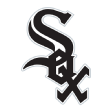 Chicago White Sox: Gary Peters (July 15, 1963, versus Orioles)
Chicago White Sox: Gary Peters (July 15, 1963, versus Orioles)
Pitching line: 9 IP, 1 H, 0 R, 0 BB, 13 SO (Game Score: 98)
Peters had an interesting career, getting four September call-ups and not establishing himself in the majors until he was 26. He led the AL twice in ERA and over a five-year span from 1963 to 1967 went 77-49 with a 2.50 ERA. He also hit 19 home runs in his career and frequently was used as a pinch-hitter. And on one July day, he stifled the Orioles with the best nine-inning Game Score in White Sox history. The only hit: a single up the middle by the opposing starter, Robin Roberts.
For argument’s sake: Philip Humber is the most unlikely pitcher to throw a perfect game, perhaps getting a little help on the final strike:
His Game Score was 96. Mark Buehrle’s perfect game was a 93, and he also received a little help from teammate Dewayne Wise for the first out in the ninth inning:
Most likely to beat it: Lucas Giolito fired a 93 with a three-hit, 12-strikeout shutout over the Twins in August, but flamethrowing Michael Kopech is set to return from Tommy John and he still hit 100 mph in spring training.
Notable: The White Sox have the third-most 90-plus games, trailing only the Dodgers and Giants. Deadball Era Hall of Famer Ed Walsh leads the way with 13 while the underrated Billy Pierce had seven in the 1950s, including a game in which he pitched 16 innings in 1959 (the season the White Sox won the pennant).
 New York Yankees: Mike Mussina (Sept. 2, 2001, versus Red Sox)
New York Yankees: Mike Mussina (Sept. 2, 2001, versus Red Sox)
Pitching line: 9 IP, 1 H, 0 R, 0 BB, 13 SO (Game Score: 98)
Yes, this was the game when Carl Everett broke up the perfect game bid with a two-out, two-strike single in the bottom of the ninth. Mussina does join Nolan Ryan, however, as the only pitcher to hold (or share) the best nine-inning Game Score for two franchises. Oh … can we put this man in the Hall of Fame already?
For argument’s sake: David Wells shares the 98 with Mussina with his perfect game, in which he struck out 11. David Cone is right behind, with 97 in his perfect game. Ron Guidry’s famous 18-strikeout game in 1978, the club record, was a 95, as he walked two and allowed four hits. I give the edge to Mussina for doing it at Fenway against his team’s archrival and in a 1-0 game (the Yankees didn’t score until the top of the ninth).
Most likely to beat it: Welcome to New York, Gerrit Cole.
Notable: Remember, we’re not counting postseason games here, otherwise Don Larsen’s perfect game would be at the top of the list. But here’s a fun fact: The Yankees are the only franchise where the best postseason Game Score matches the best in the regular season (for nine innings) — and it’s not Larsen’s perfect game, but Roger Clemens’ 15-strikeout one-hitter against the Mariners in the 2000 ALCS. That 98 is the best Game Score in postseason history.
